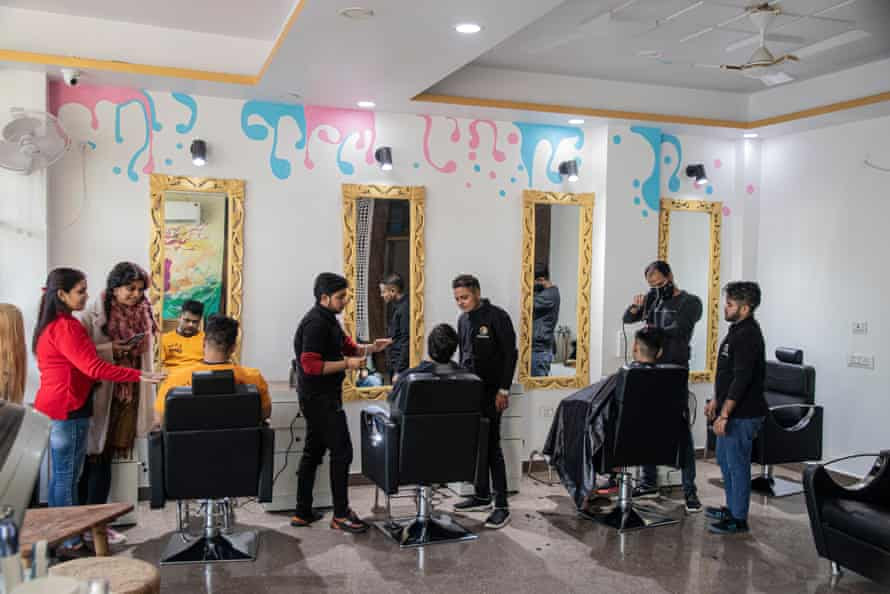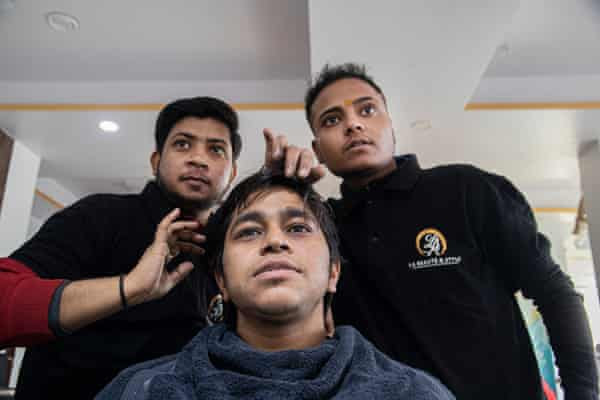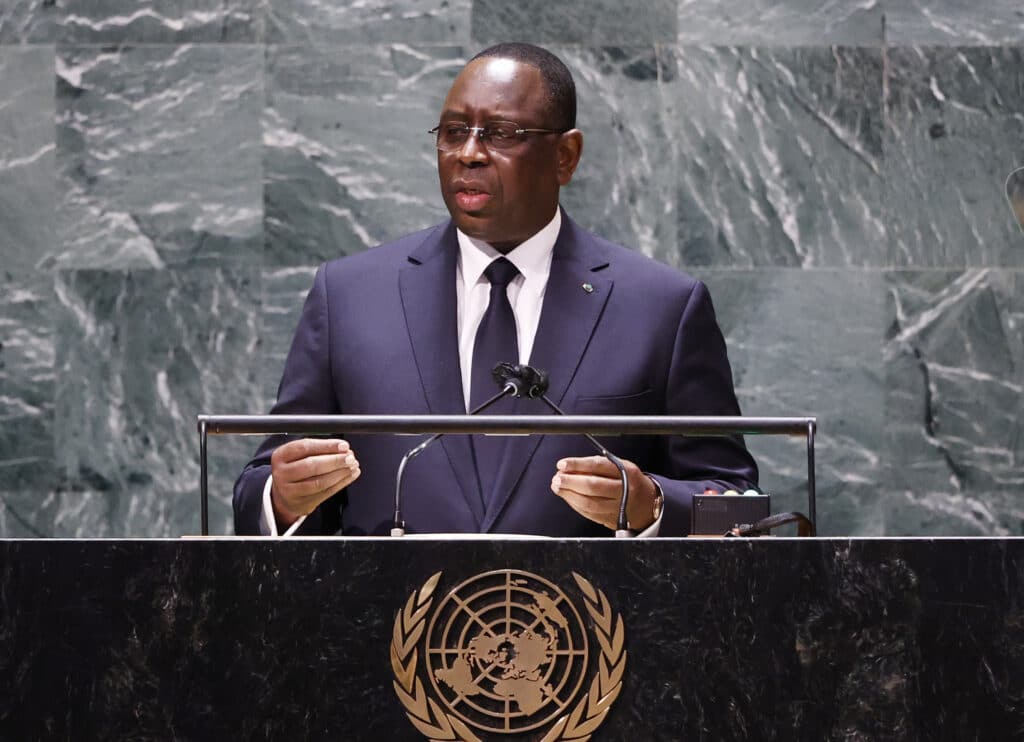‘It’s so liberating’: India’s first salon run by transgender men
The beauty treatments listed at the new La Beauté & Style salon are much the same as those offered by the dozen or so other parlours that dot the traffic-heavy Dilshad Extension area of Ghaziabad, 17 miles (28km) east of Delhi. But that is where the similarity ends.
The wall behind the reception desk is painted in rainbow colours; a mural of a trans man with flowing multicoloured locks decorates another wall; a woman wearing a sari is having her eyebrows plucked next to a trans man who is telling a stylist how he would like his hair cut.
I feel loved and appreciated here. I no longer have to act or hide behind a different identity just to do my job
Nakshatra Rajput, salon employee
La Beauté & Style salon created history in September when it opened as India’s first salon run by transgender men. The owner, Aryan Pasha, 30, is a lawyer, activist and India’s first transgender male bodybuilder. He opened the salon to create a space where trans people would feel comfortable requesting beauty treatments. Everyone is welcome, he says, not just the LGBTQ+ community.
Of equal importance was creating a business that would generate employment for his community, which “continues to face social discrimination and rejection in academic institutes, as well as at workplaces, despite the Transgender Persons (Protection of Rights) Act 2019,”, he says.
“While conducting food and ration-distribution drives during the epidemic, it was heartbreaking to encounter young transgenders who were educated and skilled but jobless due to their gender. They were surviving on charity donations, while others were forced to return to unsupportive and abusive families in their villages,” says Pasha.

With financial help from the Joint United Nations Programme on HIV/Aids and the Gravittus Foundation, a Pune-based charity that works for social change, Pasha set up the salon with his partner, Laxmi Narayan Tripathi, 43. .
Tripathi has been a transgender activist since 1999, campaigning for numerous causes from HIV to community-led social enterprises. Through their charity, the Gaurav Trust, the couple focuses on raising awareness and protecting the health and rights of male sex workers and others within the LGBTQ+ community.

“Despite our collective advocacy and action over the years to mainstream issues like the welfare, rights and health of transgender people, stigma remains a major challenge. We face a hostile environment within schools, colleges and at the workplace, which leaves us scarred for life,” says Pasha, who transitioned from female to male after gender-reassignment surgery in 2011.
According to a 2017 study by India’s National Human Rights Commission, 92% of transgender people in India are deprived of the right to participate in any form of economic activity in the country; 99% have suffered social rejection on more than one occasion, including from their family; and 96% are denied jobs and forced into areas such as sex work or begging to survive.

At Le Beauté, the six newly trained staff earn £100 to £300 a month, depending upon their level of expertise and skill.
More beauticians are being trained near Mumbai. “We plan to open our next salon in Pune and ultimately go national once we get more funding,” says Pasha.
Bhanu Rajodiya, 25, says he was at the lowest point in his life when Pasha recruited him. “I used to work at an export house in Delhi and earn £80 to £100 a month, but I lost my job during the pandemic. My family turned its back on me, but the salon embraced me and I now have a secure job with a fixed income. It’s so empowering.”
Another employee, Nakshatra Rajput, who transitioned last year, worked in Delhi as a team leader but lost his job when the management discovered his identity.

“They started finding faults in my work and the work atmosphere became so toxic, I had no choice but to leave. This was despite the fact that I was transparent about my gender to the HR department when I joined. They hired me for my skills and paid me well, but kicked me out at whim,” says the 25-year-old.
Rajput added that though his parents and friends had accepted him, Indian workplaces were far from inclusive. “This discrimination really hurts. After leaving my first company, I joined another one but had to leave that also within days because of my identity,” he says.
However, he is happy that La Beauté opened a door for him and trained him as a hairstylist – and has recently made him a part of the salon’s management team. “I feel loved and appreciated here,” he says.
“I no longer have to act or hide behind a different identity just to do my job. It’s so liberating. And that’s how society should be too – inclusive and diverse,” he says pointing proudly to the salon’s rainbow-hued walls.
Sign up for a different view with our Global Dispatch newsletter – a roundup of our top stories from around the world, recommended reads, and thoughts from our team on key development and human rights issues, delivered to your inbox every two weeks:
